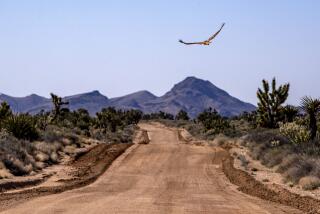Honoring a Champion of West Africa’s Wildlife
- Share via
Hippo teeth had cachet.
The way hunters saw it, elephant tusks and meat also were fine take-home prizes in the forests of southeast Liberia. Back then, in the early ‘70s, whole villages would slaughter an elephant in the forest and drag the pieces home, recalled Alexander Peal, who was a district forest officer for the country at the time. That was his introduction to the so-called wildlife protection laws in his West African homeland; the regulations, he found, were too loose to enforce.
Since then, Peal has established Liberia’s first and only national park and led other efforts to protect wildlife and habitat there--despite the country’s recent civil war and his own self-imposed exile. Now living in Temecula, Peal is among seven winners of the Goldman Environmental Prize, the world’s largest monetary award for grass-roots environmentalism.
Today in San Francisco, the winners, from six continental regions, will each receive $125,000 (two from Paraguay will split the award). The prize was founded in 1990 by philanthropists Richard and Rhoda Goldman, who have supported environmental causes, primarily in California.
Richard Goldman said Peal was recognized for his environmental commitment under extraordinary circumstances, including death threats.
“We felt that the combination of dedication, commitment under threat and willingness to go back and see the projects through made him special,” Goldman said.
Peal said he couldn’t believe he was among the honorees. In Liberia, his work is sometimes met with disdain. Critics have dubbed him “the wildlife man” and hassled him in restaurants, saying, “There’s bush meat in this soup. You can’t eat it.” (He does not eat the meat of wild animals.)
Peal, a married father of two, is now president of the nonprofit group the Society for the Conservation of Nature of Liberia. He still spends much of his time leading conservation efforts in the country, and has been hired by other environmental groups to work on similar projects in Africa. Until recently, he had worked odd jobs to help support his family; his wife, Emily Guegbeh Peal, runs her own business, selling West African cloth and other goods.
The seed for Peal’s activism was planted in 1975, when he visited a national park and wildlife preserve in Tanzania on a postgraduate project. He was stunned by the numbers of zebras, lions and cheetahs.
“I thought how wonderful nature was to have all these animals in one place, and each individual species doing their own thing, and living peacefully in a wild setting. Right away, I thought of the things I could do.”
Two years later, Peal organized and headed a Wildlife and National Parks section for Liberia’s forest authority, and in 1983, he worked with the World Wildlife Fund and the World Conservation Union to create Sapo National Park in Liberia. The 332,000-acre park, in the tropical lowland rain forest, is home to crocodiles, leopards, elephants and more than 500 species of birds.
He then led efforts to draft and enact the country’s wildlife and national park laws but was interrupted when civil war broke out in late 1989. With his family, Peal fled to Southern California and continued to work on environmental plans for Liberia. Within weeks of a 1997 cease-fire agreement, he had returned to Liberia to assess environmental damage.
Through his group’s public education campaign, he and other members educate people about conservation issues--explaining, for instance, why it’s not so easy to catch Diana monkeys in the forests anymore for meat. “People thought they were running away,” Peal said. “We said, ‘They’re not running away. You are destroying them.’ ”
Information on the Goldman Environmental Prize: https://www.goldmanprize.org. Information on the Society for the Conservation of Nature of Liberia: pseesee@aol.com.
More to Read
Sign up for Essential California
The most important California stories and recommendations in your inbox every morning.
You may occasionally receive promotional content from the Los Angeles Times.













